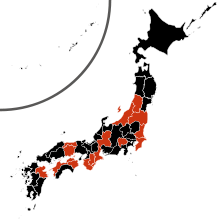2009 swine flu pandemic in Japan: Difference between revisions
No edit summary |
No edit summary |
||
| Line 2: | Line 2: | ||
{{seealso|2009 swine flu outbreak by country}} |
{{seealso|2009 swine flu outbreak by country}} |
||
[[Image:H1N1 Japan Map.svg|thumb|right|H1N1 in Japan {{legend|#FF0000|Confirmed cases}}{{legend|#FFCC00|Suspected cases}}{{legend|#000000|Deaths with confirmed infections}}]] |
[[Image:H1N1 Japan Map.svg|thumb|right|H1N1 in Japan {{legend|#FF0000|Confirmed cases}}{{legend|#FFCC00|Suspected cases}}{{legend|#000000|Deaths with confirmed infections}}]] |
||
[[Image:Advertisement of Drugstore in Hyogo Japan at Swine Flu.jpg|thumb|left|Surgical masks selling out in [[Hyogo, Japan]] due to Influenza A H1N1 2009 swine flu outbreak]] |
[[Image:Advertisement of Drugstore in Hyogo Japan at Swine Flu.jpg|thumb|left|Surgical masks selling out in [[Hyogo, Japan]] due to Influenza A H1N1 2009 swine flu outbreak (Mexican Flu)]] |
||
The [[Ministry of Agriculture, Forestry and Fisheries (Japan)|Ministry of Agriculture, Forestry and Fisheries]] of Japan instructed animal quarantine offices across [[Japan]] to examine any live pigs being brought into Japan to make sure they are not infected with the influenza.<ref>{{cite web|url=http://home.kyodo.co.jp/modules/fstStory/index.php?storyid=435522|title=Japan on high alert for swine flu after outbreak in Mexico|publisher=[[Kyodo News]]|date= 2009-04-26|accessdate=2009-04-26}}</ref> Japanese Agriculture Minister [[Shigeru Ishiba]] appeared on television to reassure customers that it is safe to eat pork.<ref name="Press">[http://english.cna.com.tw/SearchNews/doDetail.aspx?id=200904280012 MOFA issues red travel alert for Mexico on swine fluu]. [[Central News Agency (Republic of China)|CNA]]</ref> The Japanese farm ministry said that it would not ask for restrictions on pork imports because the virus was unlikely to turn up in pork, and would be killed by cooking.<ref name=Reuters426>{{cite web|url=http://www.reuters.com/article/europeCrisis/idUST344175|title=FACTBOX-Asia moves to ward off new flu virus|date=2009-04-26|publisher=Reuters}}</ref> |
The [[Ministry of Agriculture, Forestry and Fisheries (Japan)|Ministry of Agriculture, Forestry and Fisheries]] of Japan instructed animal quarantine offices across [[Japan]] to examine any live pigs being brought into Japan to make sure they are not infected with the influenza.<ref>{{cite web|url=http://home.kyodo.co.jp/modules/fstStory/index.php?storyid=435522|title=Japan on high alert for swine flu after outbreak in Mexico|publisher=[[Kyodo News]]|date= 2009-04-26|accessdate=2009-04-26}}</ref> Japanese Agriculture Minister [[Shigeru Ishiba]] appeared on television to reassure customers that it is safe to eat pork.<ref name="Press">[http://english.cna.com.tw/SearchNews/doDetail.aspx?id=200904280012 MOFA issues red travel alert for Mexico on swine fluu]. [[Central News Agency (Republic of China)|CNA]]</ref> The Japanese farm ministry said that it would not ask for restrictions on pork imports because the virus was unlikely to turn up in pork, and would be killed by cooking.<ref name=Reuters426>{{cite web|url=http://www.reuters.com/article/europeCrisis/idUST344175|title=FACTBOX-Asia moves to ward off new flu virus|date=2009-04-26|publisher=Reuters}}</ref> |
||
Revision as of 06:55, 23 May 2009


The Ministry of Agriculture, Forestry and Fisheries of Japan instructed animal quarantine offices across Japan to examine any live pigs being brought into Japan to make sure they are not infected with the influenza.[1] Japanese Agriculture Minister Shigeru Ishiba appeared on television to reassure customers that it is safe to eat pork.[2] The Japanese farm ministry said that it would not ask for restrictions on pork imports because the virus was unlikely to turn up in pork, and would be killed by cooking.[3]
On April 30, 2009 the first suspected case was detected at Narita Airport. However, the case turned out to be a conventional strain of influenza A subtype H3N2 (Hong Kong A strain).[4] On May 1, 2009 the second suspected case was detected in Yokohama.[5] This case also turned out to be a conventional strain of influenza A subtype H1N1 (Russian A strain).[6] Meanwhile Japan has not stopped any flights or means of travelling between Japan and Mexico.
On May 8, the first three cases were confirmed. The infected patients had spent time in Oakville, Canada and returned to Japan via Detroit.[7][8] On May 10, another case was confirmed from a student who came from a school trip to Canada, making it the fourth case of Japan.[9]
On May 16, the first domestic infection was confirmed in Kobe city. The male high school student did not have a history of travel abroad and thought it was a seasonal flu, and PCR test was not done in timely manner. Two other students are suspected, and 17 other students are claiming influenza-like symptoms. The route of the infection was not traceable.[10]
On May 18, 130 cases had been confirmed, including employees of a railway kiosk and a bank. Several railway kiosks in Kobe were closed, and 70 other bank workers who had worked with the infected person were told to stand by at home. All schools in the Osaka and Hyogo prefectures were suspended. [11]
References
- ^ "Japan on high alert for swine flu after outbreak in Mexico". Kyodo News. 2009-04-26. Retrieved 2009-04-26.
- ^ MOFA issues red travel alert for Mexico on swine fluu. CNA
- ^ "FACTBOX-Asia moves to ward off new flu virus". Reuters. 2009-04-26.
- ^ "A female passenger having arrived from Los Angels was suspected of the new influenza". Yomiuri Shimbun. 2009-04-30. Retrieved 2009-05-01.
- ^ "Japan's 1st suspected case of new influenza virus detected". Kyodo News. 2009-05-01. Retrieved 2009-05-01.
- ^ "Yokohama high school student confirmed to be not carrying the new influenza". Yomiuri Shimbun. 2009-05-01. Retrieved 2009-05-01.
- ^ "Japáo confirma primeiros três casos de gripe H1N1" (in Portuguese). O Globo. 2009-05-08. Retrieved 2009-05-08.
- ^ "Japan confirms 3 cases of new flu strain". Reuters. May 8, 2009. Retrieved 2009-05-09.
- ^ "NHK- Japan Confirms 4th Case Of Swine Flu". Pacific News Center. 2009-05-10. Retrieved 2009-05-10.
- ^ "First domestic case of H1NI flu infection confirmed in Japan". The Japan Times. Saturday, May 16, 2009. Retrieved 2009-05-16.
{{cite web}}: Check date values in:|date=(help) - ^ Cite error: The named reference
japan2was invoked but never defined (see the help page).
